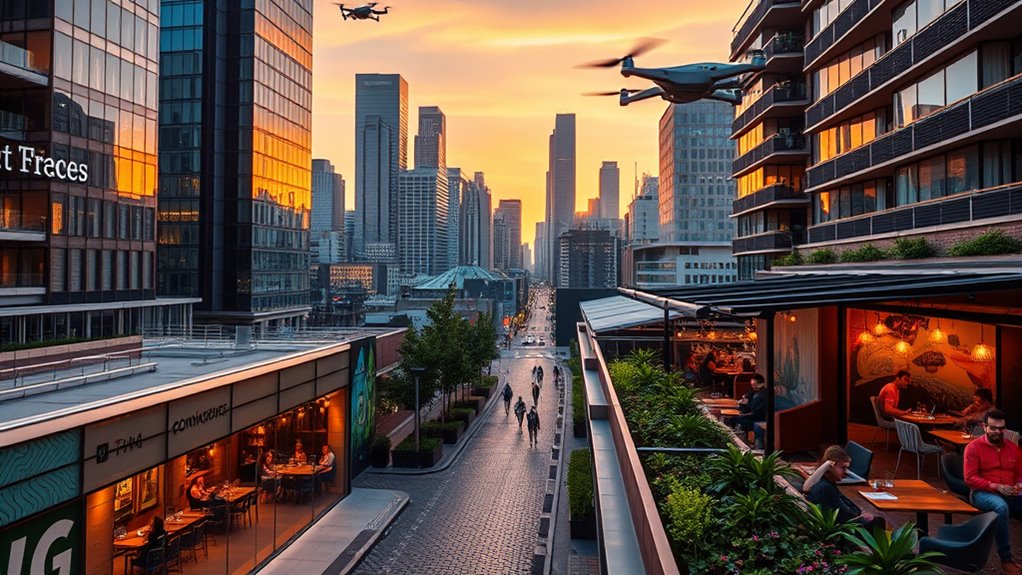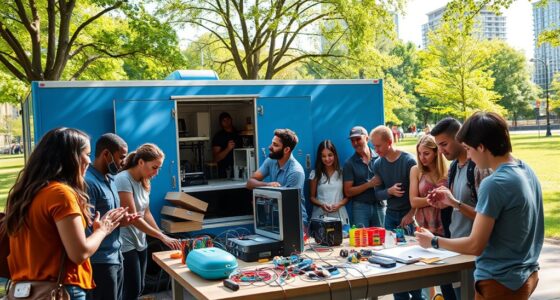If you’re looking for digital nomad cities built for remote creators, focus on places with reliable internet, affordable costs, and vibrant communities. Cities like Mexico City, Tokyo, and Tbilisi offer a perfect blend of connectivity, safety, and culture. Emerging destinations such as Asuncion and Da Nang are also gaining popularity for their great quality of life and growth potential. Discover more about these top hubs and what makes them ideal for your remote work journey.
Key Takeaways
- Cities investing in high-speed, reliable digital infrastructure to support seamless remote work experiences.
- Locations offering flexible visa policies and long-term stay options tailored for digital creators.
- Urban environments with abundant coworking spaces, community hubs, and networking opportunities for collaboration.
- Affordable living costs combined with safety and quality healthcare to sustain long-term remote work.
- Rich cultural scenes and local experiences that inspire creativity and enhance the remote working lifestyle.

Are you curious about where digital nomads are flocking in 2025? If you’re seeking the perfect city to work, explore, and connect, you’ll find several destinations designed for remote creators like you. These cities aren’t just popular; they’re built with the needs of digital nomads in mind. They combine reliable internet, vibrant culture, affordability, and welcoming communities, making them ideal for long-term stays.
Mexico City stands out as a top choice, thanks to its affordability and energetic cultural scene. As a digital nomad, you’ll appreciate the mix of coworking spaces and cozy cafes, perfect for productivity and inspiration. Tokyo remains a favorite, offering cutting-edge infrastructure, safety, and a seamless blend of tradition and innovation. Its tech-friendly environment ensures you stay connected and efficient, whether you’re working on a project or exploring the city’s rich history. Tbilisi, Georgia, has gained popularity for its low-cost living, fast internet, and flexible visa policies. It’s a hub for entrepreneurs and freelancers, fostering a community of like-minded individuals. Meanwhile, Madrid and Paris continue to attract remote workers with their cultural richness, vibrant street life, and the convenience of digital nomad visas in Spain and France.
Mexico City, Tokyo, Tbilisi, Madrid, and Paris are top digital nomad hubs offering culture, affordability, and excellent infrastructure.
Cities like Asuncion, Paraguay, and Da Nang, Vietnam, have experienced remarkable growth, welcoming more digital nomads each year. Asuncion’s +111% increase showcases its rising appeal, offering affordability and a relaxed lifestyle. Da Nang draws remote workers with its scenic beaches and developing infrastructure, supporting a balanced work-life routine. Bansko and Ko Pha Ngan, Thailand, also see steady growth, providing quieter environments and nature retreats for those seeking tranquility alongside work. Additionally, these cities are investing in digital infrastructure to support the increasing demands of remote workers.
Across these cities, amenities play a crucial role. Reliable internet, co-working spaces, and good public transport are essentials. Digital nomads value community support and cultural experiences, making cities with active social scenes especially attractive. Flexible visa policies and safety further influence choices, ensuring that you can settle in without hassle and focus on your work and adventures. Recent data shows that these cities are not only popular now but are expected to remain key hubs for remote work in the coming years, demonstrating their long-term potential.
Looking ahead, emerging hubs like Athens, Porto, and Warsaw are gaining traction. These cities offer a combination of affordability, connectivity, and local charm. As digital nomadism evolves, long-term stays and community-driven projects are becoming more common, emphasizing the desire for meaningful connections and sustainable living. Whether you’re a freelancer, remote worker, or entrepreneur, these cities are designed for your lifestyle—fostering innovation, freedom, and community. In 2025, the best digital nomad cities are those built for creators who want to thrive while exploring the world on their terms.
Frequently Asked Questions
What Affordable Cities Are Best for Digital Nomads?
When choosing affordable cities for digital nomads, you should consider cost, internet quality, community, and visa options. Chiang Mai stands out with its low rent and reliable internet, plus a strong nomad community. Medellín offers affordable living and vibrant social scenes. Tbilisi provides a good balance of cost and modern amenities, while Mexico City and Budapest combine reasonable prices with solid infrastructure. Pick a city that matches your budget and remote work needs.
How Do Cities Support Remote Work Infrastructure?
Did you know some cities offer internet speeds up to 230 Mbps? Cities support remote work infrastructure by investing in high-speed, reliable internet, ensuring you stay connected. They also provide numerous co-working spaces and community events to foster networking and collaboration. Visa options like digital nomad visas and freelancer permits make it easier for you to stay long-term. Plus, affordable living costs and cultural experiences enhance your remote work lifestyle.
What Safety Measures Are in Place for Nomads?
You should prioritize safety measures like using reliable VPNs to secure your internet, enabling two-factor authentication for accounts, and choosing encrypted communication tools. Make certain your devices are updated and back up important data regularly. Join coliving and coworking spaces with security features, participate in local meetups, and stay informed through online forums. Always have access to emergency services, legal advice, and health insurance to stay protected both digitally and physically.
Are There Visa Options for Long-Term Stays?
Yes, many countries offer visa options for long-term stays. You can apply for Portugal’s D8 Visa, which lets you stay up to a year or longer. Spain’s Startup Law Visa provides renewable 12-month permits, and Estonia offers a one-year Digital Nomad Visa. Croatia’s visa allows up to 12 months without local tax on income, while El Salvador grants two-year stays with renewal options. These visas give you flexibility for extended remote work.
How Do Local Cultures Influence Remote Work Experiences?
They say “When in Rome, do as the Romans do,” and that rings true for remote work too. Local cultures shape your experience by influencing how you connect, communicate, and collaborate. Embracing traditions, customs, and language helps you build genuine relationships and gain deeper insights into the community. Respecting local values fosters mutual understanding, making your stay enriching. Ultimately, cultural appreciation turns work from just a task into a meaningful exchange.
Conclusion
As you pack your digital toolkit and step into these vibrant cities, imagine yourself dancing through bustling streets, your laptop glowing like a lighthouse guiding your creative voyage. These cities aren’t just spots on a map—they’re your launchpads, built for your dreams to take flight. With every coffee shop buzz and sunset vista, you become part of a living mosaic of remote creators. Embrace the journey, and let these cities fuel your passion like a wildfire across endless horizons.









